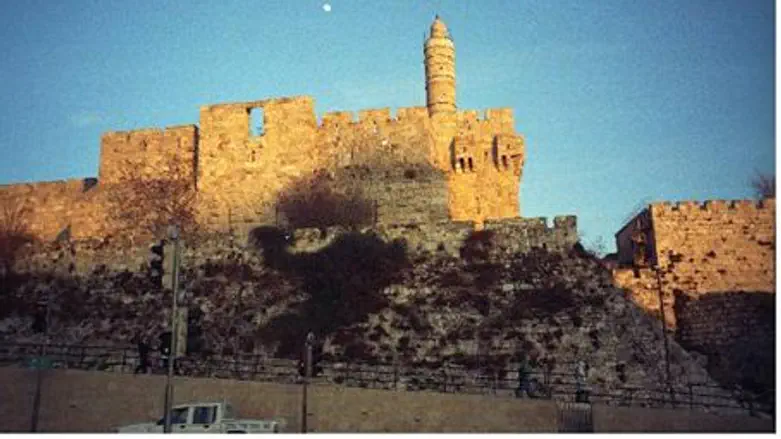
Tuesday night and Wednesday are a special day for lovers of Jerusalem, which celebrates the 44th anniversary of its Six-Day War reunification.
Among the central events planned for this Jerusalem Day are traditional festivities at Yeshivat Merkaz HaRav Kook, including all-night Torah lectures, singing, dancing to music of the famed clarinetist Musa Berlin, and each year since the liberation of the city, a march of hundreds to the Western Wall starting at 1 a.m. Prime MInister Benyamin Netanyahu, many Knesset Members and rabbis from all over Israel come to join the yeshiva's celebration.
Festive prayers take place in central Jerusalem synagogues such as Heichal Shlomo and others. A special program will take place at Yeshivat Beit Orot on Mt. Scopus, overlooking the Temple Mount, which will be followed by music, dancing, a dinner, and an inspiring presentation by noted historian Dr. Eyal Davidson.
The central event in the capital on Wednesday will be the traditional Rikudgalim - Flag Dance March - towards the Old City. Though it has long been concentrated on Jaffa Rd., as well as on other streets – with separate routes for girls and boys – this year’s march will be adapted to meet the needs of the new light-rail transportation system. Many of the marchers will enter the Old City through Damascus Gate, while others will circle around the south, adjacent to Mt.of Olives, and enter through Dung Gate. Various tours of different parts of the city are sponsored by the municipality and other organizations all through the day.
The day commemorates the miraculous liberation of the Old City of Jerusalem on the 28th of Iyar, 5727 (June 7, 1967), just days after several Arab armies threatened to wipe the State of Israel off the map. Israel took the initiative with a surprise, defensive attack, wiping out the Egyptian Air Force in one day, and taking over Jerusalem, Gaza, Judea, Samaria, the Sinai and the Golan Heights shortly thereafter. Weeks of national trepidation and tension, including the preparing of thousands of body-bags in Jerusalem and elsewhere, suddenly gave way to celebration and thanksgiving.
It has been noted many times that in the days prior to the war, Israel used its informal ties with Jordan’s King Hussein to ask him repeatedly to hold its fire and forces and allow Israel to concentrate only on its Egyptian and Syrian fronts. Had Hussein listened, the course of history would have been very different, as Israel would not have liberated Jerusalem, Judea or Samaria – at least not then.
The war marked Israel’s return to the Old City of Jerusalem for the first time since having been ignominiously driven out in 1948, and for the first time in 1,899 years as sovereign rulers.
In fact, though most Jews were thrilled in 1948 when the renewed State of Israel was established, for others the joy was greatly tempered by the lack of inclusion in its borders of the holy sites of Jerusalem– and particularly the Temple Mount.
The continued longing for Jerusalem and other Biblical areas was expressed by Rabbi Tzvi Yehuda Kook, the head of Yeshivat Merkaz HaRav. Speaking to his students on Independence Day of 1967, just weeks before the Six Day War, he appeared to be gripped by prophecy when he cried out, "Where is our Hevron? Have we forgotten it? And where is our Shechem (Nablus)? Have we forgotten it? And where is our Jericho? Have we forgotten it?! ... And where is all the rest of the Land of Israel? Where are all the pieces of G-d's Land? Do we have the right to give up even one millimeter? Heaven forbid!"
One of his students, Rabbi Chanan Porat, who was later to be a leader in the movement to settle all of the Land of Israel, said that the rabbi's emotion was so extreme that it left an impression on him forever: "He roared and cried out from the depths of his heart; we saw that he was truly like one crying over someone who had just died, as if he was torn in pieces. We felt as if he was speaking in the name of the Landof Israel, and that its tearing-asunder was tearing his own flesh as well."
Just days after Rabbi Kook’s emotional cry, Egypt placed a blockade around the Straits of Tiran leading into Israel, and preparations for war began. Within three weeks, Hevron, Jericho, Shechem and Jerusalem were once again in Jewish hands. Rabbi Kook and his friend the Nazir, Rabbi David Cohen, were given a special military escort to the Western Wall within hours of its liberation.
Just a few months later, she was able to add these lyrics as the final stanza: "We have returned to the cisterns, To the market and to the market-place, A ram's horn (shofar) is heard on the Temple Mount, In the OldCity." The song Jerusalem of Gold quickly became Israel's unofficial national anthem, sung in joy at every opportunity.